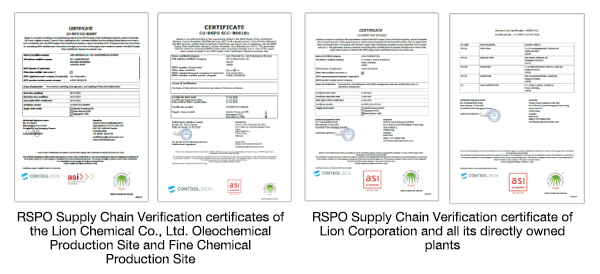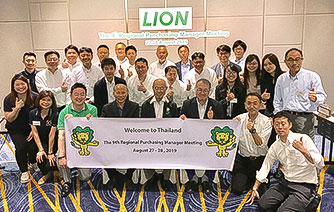Lion aims to contribute to the achievement of the Sustainable Development Goals (SDGs), a set of shared worldwide goals for 2030. However, palm oil derivatives and pulp and paper products, which are key raw materials in Lion's products, present risks to sustainable development in terms of human rights, labor issues and environmental issues. To address these risks, we have established the Sustainable Material Procurement Policy. Based on this policy, we are advancing initiatives aimed at the sustainable procurement of palm oil derivatives and pulp and paper products.
Lion is proactively advancing the utilization of plant-derived materials that are carbon neutral and non-depletable. Among the plant-derived materials that Lion uses are derivatives of palm oil—the world’s leading vegetable oil in terms of production volume. Palm oil is produced in principally Malaysia and Indonesia.




Global palm oil production is increasing year by year, partly because oil palms are highly productive and can be harvested throughout the year. However, with the rapid expansion of production, a number of issues have arisen in producing regions, such as the destruction of tropical rainforests and wildlife habitats as land is cleared for the development of new plantations. Furthermore, improper farming operations involving a wide range of human rights and labor abuses that reflect a lack of social justice have been identified. These include poor labor conditions with inadequate consideration given to health and safety, low wages, improper treatment of immigrant workers and the use of child labor.
Since 2006, Lion has been a member of the “Roundtable on Sustainable Palm Oil (RSPO),*” which works toward the resolution of such issues. In 2012, the Oleochemical Production Site of Lion Chemical Co., Ltd., a domestic affiliate that procures palm oil from Malaysia and Indonesia, passed the RSPO’s supply chain certification system inspection and was certified as a plant that may handle RSPO-certified palm oils. Accordingly, Lion started procuring RSPO-certified palm oils from 2012. The Lion Chemical Corporation Fine Chemical Production Site received RSPO supply chain certification in March 2020, and Lion Corporation and all its plants (the Chiba Plant, Odawara Plant, Osaka Plant and Akashi Plant) were certified in August 2020.
Lion aimed to ensure that all the palm oil derivatives it uses are RSPO certified by the end of 2020. As of the end of 2020, Lion had switched to RSPO-certified products for 93% of its key raw materials.
Going forward, we will continue to work to procure sustainable palm oil.
Targets:
For all palm oil, palm kernel oil and their derivatives used in the domestic Lion Group’s consumer products to meet the sustainability standards of third-party institutions by the end of 2030.
*
The Roundtable on Sustainable Palm Oil
The Roundtable on Sustainable Palm Oil (RSPO) believes that for palm oil production to be sustainable, it must not only be compliant with relevant laws and regulations, but economically sustainable, environmentally appropriate and socially beneficial. These requirements are laid out concretely in the RSPO Principles and Criteria. Only palm oil produced in accordance with these seven principles and 40 criteria can be RSPO-certified.

Pulp and paper are used in the manufacture of Lion’s product packaging, booklets and pamphlets as well as in the copy paper and other office supplies the Company purchases. In order to better protect biodiversity in the procurement of these materials, based on the Sustainable Material Procurement Policy, we are advancing the procurement of third party-certified paper products. As of the end of 2020, 98% of such products procured from domestic manufacturers were third-party certified. In addition, we have identified the country of harvest for 100% of the woodchips and pulp used in our product packaging.
Target:
For all pulp and paper used in the domestic Lion Group’s consumer products to meet the sustainability standards of third-party institutions or be sourced from recycled materials by the end of 2030.
Lion has been a member of the Roundtable on Sustainable Palm Oil (RSPO), an international initiative, since 2006. Furthermore, since 2012, Lion has taken part in the Supply Chain Subcommittee of the Global Compact Network Japan, contributing to the preparation of various publications, such as an introductory text on CSR procurement.
In August 2019, we held the 9th Regional Purchasing Manager Meeting. This meeting is held annually with the goals of reducing costs at the overall Group level and reinforcing communication between the purchasing staff of participating companies by fostering personal connections.
In addition to sharing information on and discussing topics related to cost reduction, participants shared knowledge and information about sustainability, including sustainability initiatives to promote across the Group*; topics related to the Sustainable Development Goals (SDGs) as well as marine plastic waste and other environmental problems; and the Lion Group’s sustainable procurement initiatives in Japan (RSPO-certified oils and FSC-certified paper).
* A presentation on the supplier sustainability self-checks implemented in 2018 by Lion Corporation (Korea) and the necessity of CSR procurement to expand such efforts to other countries where the Group does business

The second item of Lion’s Procurement Principles states that Lion shall “Rationally select business partners not only on the basis of quality, cost and timely delivery, but also regulatory compliance, environmental protection, labor, and human rights, to fulfill our responsibility to customers and to create a sustainable, healthy society.” In line with this principle, we promote environmentally friendly green purchasing on a Company-wide basis.
We utilize an ordering system for employees’ office supplies that helps ensure that such supplies are environmentally friendly products. Through such efforts, we are carrying out our commitment to green purchasing.